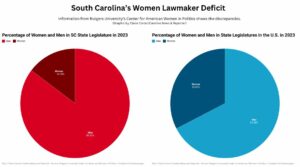South Carolina Women Struggle to Get Seat at Table in Legislature
Originally published by Claire Carter for Carolina News and Reporter
Women make up 51.3% of South Carolina’s population. But they’re only 14.7% of the state’s legislators.
Across the country, state legislatures tend to have far more men than women lawmakers. But South Carolina’s gender gap is among the widest in the nation, and political leaders say the culture is partly to blame.
South Carolina is ranked 48th for female representation in the state legislature, ahead of only Mississippi at 49th and West Virginia at 50th, according to Rutgers University’s Center for American Women and Politics.
“I think if the men took women as a model, they would learn a lot,” said Barbara Rackes, CEO of the nonprofit South Carolina Women in Leadership. “I think they could take a few lessons.”
The organization advocates for fair voting and less political polarization, while encouraging women to run for office. Rackes said women in politics are simply treated differently in South Carolina.
“One of the biggest things about women is that they’re not asked to run for office,” Rackes said.
Rackes said the conversation often goes something like this: “Joe says to Jerry, ‘Hey, why don’t you run? Bet (you’d) be a great congressman. And they don’t say that to Mary, who similarly could and should be in that role, because it’s just not their mindset.”
From campaigning to serving, South Carolinian women face unique challenges.
Nancy Williams, president of the League of Women Voters of South Carolina, said women must be ready for greater public scrutiny when running for office.
“You need a pretty thick skin to run for office,” Williams said. “Your personal life, your family’s lives, become fodder for sometimes misinformation, disinformation and scrutiny.”
Other issues are clothing choices, childcare and marital status.
Rep. Heather Bauer, D-Richland, a small business owner, said many people made assumptions about her when she decided to run for the House in 2020.
“I’m sharing, maybe more vulnerable parts of, like, where I came from and how I was raised, and so I felt very vulnerable,” Bauer said.
Southern women ‘don’t ask for money’
Bauer has run for office three times, only winning the House seat in 2022. As with many women, she said, fundraising was a challenge.
“We were working really hard in our campaigns,” Bauer said. “Being able to raise money was really, really difficult. So I think it comes down to just, like, trust. And I guess it’s odd for women to be running for office.”
Rep. Spencer Wetmore, D-Charleston, had a similar reality when running for office. She said she has had to let go of cultural expectations to be more efficient in raising money.
“I think especially as a woman, especially in the South, we were kind of raised, you don’t talk about money,” Wetmore said. “‘You don’t ask for money. That’s just tacky.’ … And I grew up in Charleston. So those expectations were real. And then going into a world where I had to call people and say, ‘Hey, can I have $1,000?’ It’s crazy.”
Managing ‘mansplaining’
State Sen. Margie Bright Matthews, D-Colleton, said once in office, it was a challenge to get the men in office to understand her reasoning.
“The biggest challenge we had is if we gave our perspective of something, sometimes, a lot of times, they wouldn’t see our perspective but try to mansplain,” Bright Matthews said.
Mansplaining is the concept of a man explaining something to women in a way that assumes he knows more because he’s a man.
Bright Matthews said she was often ignored when she served on committees concerning agriculture or wildlife.
“I like the coast, and if I start asking questions about fish or something, they’re looking at me like, ‘What are you talking about? That’s our area,’” Bright Matthews said. “In other words, the challenges are sometimes they don’t think we understand things.”
Rackes said in areas other than family and children’s issues, women are assumed to know nothing. She saw this in real-time when she suggested a woman for a position at the Department of Natural Resources.
Rackes said the woman got blowback from political leaders who assumed she wouldn’t know as much about natural resources as many men.
“I said, ‘You’re telling me women don’t know about natural resources?’ I mean, it’s one thing to say not many women go duck hunting or quail hunting or whatever,” Rackes said. “… But at the same time, we can understand wetlands.”
Women bring a new outlook
Bright Matthews said when she first ran for the Senate in 2015, she had to weigh the responsibilities of being a mom, wife and attorney and how her time could be divided.
Dr. Dawn Bingham, an OB/GYN and chair of South Carolina’s American College of OB/GYNs, ran unsuccessfully for the state Senate in 2020. She said she saw her career and family as a driving force for her run.
Bingham said women’s healthcare and family healthcare were often put on the back burner in South Carolina before she became a legislator.
“When we noticed that our legislature is predominantly men,” Bingham said, “predominantly white men, predominantly old white men, and none of whom are involved, essentially, in health care, the viewpoint and the perspective and the way that women experience the world is not going to be represented very appropriately.”
Rackes thinks women bring new perspectives but also a new way of pushing policy because they are used to having to win people over.
“We have never had the authoritarian power that many men have had,” she said. “We can’t just say do this. We have to persuade people to come around to our way of thinking.”
